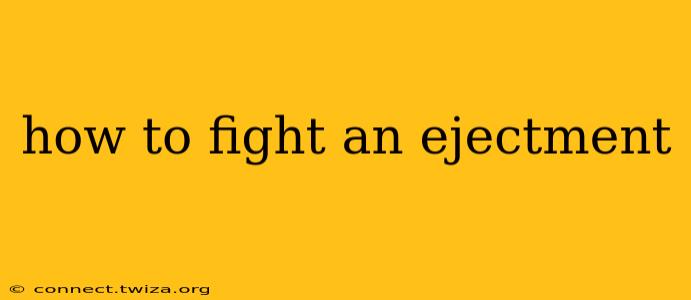Facing an eviction lawsuit, or ejectment, can be incredibly stressful. Understanding your rights and the process is crucial to protecting your housing. This guide outlines the steps you can take to fight an eviction and improve your chances of a successful outcome. Remember, this information is for general guidance only and is not a substitute for legal advice. You should consult with an attorney immediately if you are served with eviction papers.
What is an Ejectment (Eviction) Lawsuit?
An ejectment lawsuit, often called an eviction, is a legal process a landlord uses to remove a tenant from a rental property. This typically happens when a tenant violates the terms of their lease agreement, fails to pay rent, or otherwise breaches the conditions of their tenancy. The specifics vary by state and local laws.
What are the Grounds for an Eviction?
Landlords can't evict tenants without a valid legal reason. Common grounds include:
- Non-payment of rent: This is the most frequent cause of eviction.
- Lease violation: Breaching the terms of your lease agreement, such as having unauthorized pets or subletting without permission.
- Damage to property: Causing significant damage to the property beyond normal wear and tear.
- Illegal activity: Engaging in illegal activities on the property.
- Disturbing other tenants: Creating a nuisance that significantly impacts other residents.
How to Respond to an Eviction Notice
Receiving an eviction notice is a serious matter. Don't ignore it! Here's how to react:
- Read the notice carefully: Understand the specific reasons cited for the eviction.
- Gather your documentation: Collect any evidence that contradicts the landlord's claims, such as proof of rent payments, lease agreements, or communication with the landlord.
- Seek legal counsel immediately: An attorney specializing in tenant rights can advise you on your legal options and help you build a strong defense.
What are My Defenses Against an Eviction?
Several defenses may be available depending on the circumstances of your case:
- The eviction notice wasn't properly served: If the notice wasn't served according to your state's legal requirements, the eviction may be invalid.
- The landlord failed to follow proper eviction procedures: Landlords must adhere to specific legal steps before initiating an eviction. Failure to do so can be grounds for dismissal.
- Retaliatory eviction: If you've recently reported a housing code violation or requested repairs, the eviction may be retaliatory and therefore illegal.
- Breach of the implied warranty of habitability: Your lease implies that the property is habitable and safe. If the landlord has failed to maintain these standards (e.g., significant repairs are needed), you may have a defense.
How Do I Find Legal Assistance?
Finding legal help is vital in an eviction case. Options include:
- Legal aid societies: Many non-profit organizations offer free or low-cost legal assistance to low-income tenants.
- Tenant rights organizations: These groups can provide information, resources, and sometimes legal representation.
- Private attorneys: While potentially more expensive, a private attorney can provide comprehensive legal representation.
What Happens During the Eviction Hearing?
If the case goes to court, be prepared for a hearing. This will involve presenting your evidence and arguments to a judge. Your attorney will play a crucial role in guiding you through this process.
Can I Negotiate With My Landlord?
Before going to court, consider negotiating with your landlord. If you're facing eviction due to non-payment of rent, you might be able to work out a payment plan. However, it's wise to have legal counsel present during any negotiations.
What Happens if I Lose the Eviction Case?
Losing an eviction case means you'll be ordered to vacate the property. Failing to comply could lead to further legal consequences. It's crucial to comply with the court's order to avoid additional problems.
This information provides a general overview of how to fight an eviction. Remember, eviction laws vary by jurisdiction, and consulting with a legal professional is essential to protect your rights. Don't hesitate to seek legal help immediately if you are facing an eviction.
